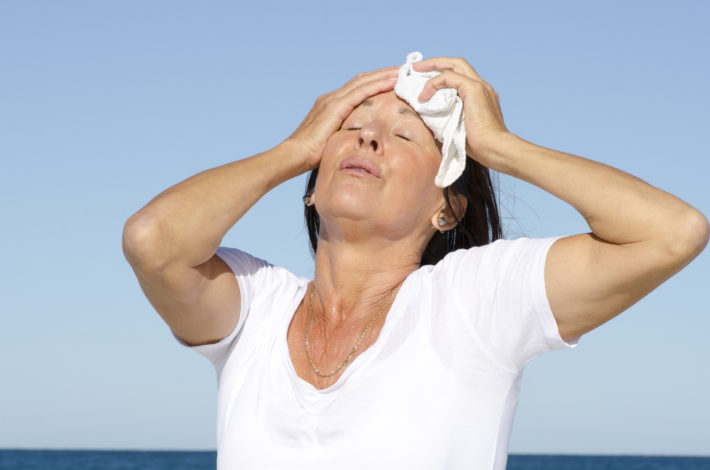
Hot flashes are the most common symptom of menopause; up to 80% of women have them and 100% wish they didn’t. They’re so synonymous with menopause that the magazine I edit is called The Hot Years.

Click Here to get a Free Subscription
Hot flashes due to menopause are more than just feeling warm. Pulses quicken, red, blotchy skin typically follows, and skin temperature can rise 5 to 7 degrees Fahrenheit, which leads to sweating that is often followed by shivering or coolness.
But menopause isn’t the only cause of hot flashes. Here are 10 other causes of hot flashes that I discuss with my patients and women I coach (click here to find out more):
1. Fever. Hot flashes due to menopausal can raise your skin temperature to 103°F and sometimes even higher, but a fever due to infection or other causes can raise core temperature that high as well. Some fevers are constant and other seem to spike like a hot flash. During the hot summer months, the temperature outside can have a similar affect and increase hot flashes.
2. Thyroid disease. Thyroid disease is common in menopausal women and an overactive thyroid speeds up metabolism and that can lead to some pretty significant sweating. You can get the same experience if you take too much thyroid medication for treatment of an underactive thyroid gland.
3. Hot, spicy foods. Ever eat a red hot chili pepper and break out in a sweat? They contain capsaicin that causes your nervous system to act as if it were burned. MSG (monosodium glutamate), which is used in Asian foods, is another culprit. The sulfites and sodium nitrates in some hot dogs and cured sandwich meats like salami, bacon, or sausages also affect some people as do nitrates and nitrites, which can form nitrosamines, a substance that can increase the risk of cancer.
4. Alcohol. Particularly fermented drinks like beer and wine can contain histamine, sulfites or tyramine that can dilate blood vessels and produce sweating and heat. And if you are in or near menopause, alcohol can increase your hot flashes.
5. Neurological Problem. Sweating is caused by a part of the autonomic nervous system, which includes the sympathetic and parasympathetic nervous systems. If the sympathetic nervous system becomes damaged or underactive for other reasons, the parasympathetic nervous system can cause flushing and sweating. Examples include spinal injury or nerve injury.
6. Headaches. Migraines and a related type of headache called cluster headaches can cause hot flashes. They impact hot flashes by affecting your autonomic nervous system, similar to neurological problems above.
7. Allergic Reaction. If you are severely allergic, for instance to a bee sting or medication, etc., your body can respond with breathing problems, a skin reaction and a fever. An allergic reaction is a medical emergency so contact your doctor at once. If you know you’re at risk for allergic reaction, carry an epipen.
8. Medications and Supplements. Some medication and over the counter products can cause hot flashes. A common one is niacin (vitamin B3), which is sometimes taken to lower cholesterol. And prescription meds like nitroglycerin, calcium channel blockers, and ED treatments like sildenafil (Viagra) and tadalafil (Cialis) can also cause flushing due to opening up your blood vessels.
9. Stress. Too much of it can release a rush of adrenaline that can produce a feeling of warmth and flushing. A little meditation and relaxation can go a long way to cooling off this cause.
10. Hormone-secreting tumors. Most of these are located in the digestive tract, appendix or lungs. The most common example is carcinoid tumor. These tumors can be pretty intense, causing diarrhea and difficulty breathing as well as hot flashes and sweating. The good news is they are slow growing and pretty rare.
For most people, hot flashes are due to menopause. If you want help knowing how to cool your hot flashes for under $20, get the Hot Flash Rescue Kit and discover all the information you need to understand how to talk with your healthcare provider about turning down the heat.



